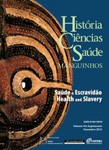January 2024
January 2024
Anthropocene is mainly understood as the current geological age, viewed as the period during which human activity has dominated climate and the environment.

Earth at Night, the Americas (https://earthobservatory.nasa.gov)
The article “Anthropocene, Human Sciences and Historiography,” by Walter Francisco Figueiredo Lowande, Professor of the Department of History at Universidade Federal de Alfenas, Minas Gerais, Brazil, discusses how the human sciences, especially historiography, can contribute to this debate. It explores how some works produced in humanities and social sciences have dealt with the relationship between causes, effects, and consequences regarding the new planetary regime, with a particular focus on the debate about the “technosphere.”
Lowande, W. F. F (2023). Antropoceno, ciências humanas e historiografia. História, Ciências, Saúde-manguinhos, 30, e2023067.
Related articles in HCS-Manguinhos:
Animals and the Anthropocene “Some will certainly argue that humans must be fed, including with the cheapest meat possible to satisfy vitamin B-12 and iron requirements, but how humane or even rational are we, with global temperatures on the rise and pandemic diseases spreading in response to the way we use the planet and its nonhuman inhabitants?”, asks the article.
La historia ambiental en HCS-Manguinhos Los artículos analizan temas como los archivos digitales de historia ambiental y la historiografía de los animales en América Latina.
Planetary Health Histories Climate change, pollution, global warming, and Anthropocene are terms that historians can also use. This interview with Warwick Anderson and James Dunk, researchers of the history department at the University of Sydney, explains what Planetary Health is.








